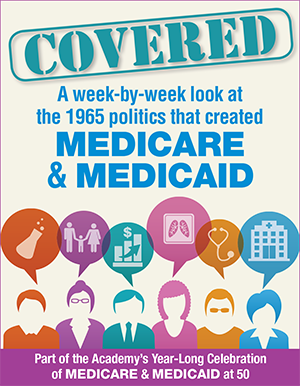Bob Rosenblatt, Special Correspondent
Throughout 2015, the Academy is working with partners to create a platform for dialogue around the history and future of these two vital programs, including this weekly Covered blog series. Covered is written by Bob Rosenblatt, a Senior Fellow at the National Academy of Social Insurance and editor of the website HelpWithAging. Learn more about the Academy’s celebration of the 50th anniversary of Medicare and Medicaid.
Docs, Key Senator Back Drug Coverage in Medicare Proposal
May 15, 1965
By Bob Rosenblatt, Special Correspondent
Washington, DC – The lack of drug coverage is a big hole in the proposed health insurance program for people over the age of 65, Senator Jacob Javits (R-NY) told the Senate Finance Committee on Tuesday. The cost of drugs is a “foremost item” for seniors paying for their health care. “It has been estimated that 25 percent of the per capita health expenditure of aged persons is for drugs,” according to Javits, who has been a long-time advocate of expanding health insurance coverage. Javits has also been a key legislative ally of Senator Clinton Anderson (D-NM), author of the health care legislative package supported by the Johnson Administration.
The current version of the legislation, approved by the House, covers the hospital costs of individuals over the age of 65 and would be financed by a payroll tax on all workers. The bill also would create a voluntary insurance plan that would cover visits to a doctor’s office. The voluntary program, known as Part B, would be financed by premiums paid by enrollees. The federal government would subsidize half the cost of the $6 monthly premium.
Adding pharmaceuticals prescribed by a doctor would increase the cost of the voluntary insurance by $1.50 a month, according to actuarial experts at the Social Security Administration. Under plan supported by Javits, the individual and the government would each pay an added 75 cents a month.
The current legislative proposal, called Medicare, passed the House in March. It is likely to be approved by the Senate as a top priority of the Johnson Administration. The program would pay for 60-days in the hospital during a spell of illness, 120-days in a nursing or rehabilitation facility after a three day stay in the hospital, and 100-days of home care visits to a former hospital patient.
Under the current proposal, drugs in the hospital prescribed by the medical staff would be covered by the federal government. But drugs prescribed in other settings, such as nursing homes, would be covered only if approved by the staff at the discharging. Any drugs prescribed by a physician in his or her office would be paid for by the individual patient.
Javits said coverage for medication is both necessary and affordable. The increase in the premium “appears to be a modest price for insurance against what is often a most burdensome expense,” he told the committee. The addition of prescription drugs to the voluntary insurance program would raise the total cost by $1.50 a total of $7.50 a month, a 25% increase.
The higher premium would be affordable because the legislative package creating Medicare also provides a seven percent increase in monthly Social Security retirement benefits. For most people, the cost of the drug coverage would be “more than covered” by increase in their monthly benefit check, Javits said.
The Javits proposal may also help a number of states. Nineteen states cover drug costs for low income seniors under Medical Assistance for the Aged, which was created by the Kerr-Mills Act. New York is one of five states with significant enrollment in Medical Assistance authorized under Kerr-Mills. An expansion of the proposed Medicare program would free up state funding for other purposes.
The American Medical Association backs the Javits’ proposal. The AMA feels that the current definition which drugs would be covered under Medicare is an “unnecessary restriction on the physician in his treatment of his patient,” Dr. Donovan F. Ward, President of the AMA, said in a statement to the Finance Committee on Tuesday. He warned of chaos if the current proposal were enacted into law. “Not only would the physician be restricted in his choice of drug (which is made on the basis of the individual patient), but different hospitals in the same area may have differing formularies.” A formulary is a list of drugs approved by the hospital staff.
If a medication has been approved by the U.S. Food and Drug Administration for safety and efficacy, that should provide sufficient protection for the patient, according to Dr. Ward. Review by a hospital committee isn’t needed, he said. “We can see no reason why a drug that has met the requirements of that law should not be prescribed if the patient’s condition warrants it.”
Dr. Ward’s testimony about drugs and related issues indicates that the AMA sees the passage of Medicare bill as inevitable, and favors amendments it feels would be helpful to physicians. What is not yet clear is a bigger issue: will doctors accept Medicare and treat patients with the new insurance coverage? Or will they go on strike, and refuse to deal with anyone who comes to the office with a government-issued insurance card?
► Directory of COVERED posts
► Read the next post in the COVERED series, “Doc Says Medicare Bill Unfair to Mentally Ill”
► Learn more about the Academy’s celebration of the 50th anniversary of the enactment of Medicare and Medicaid

